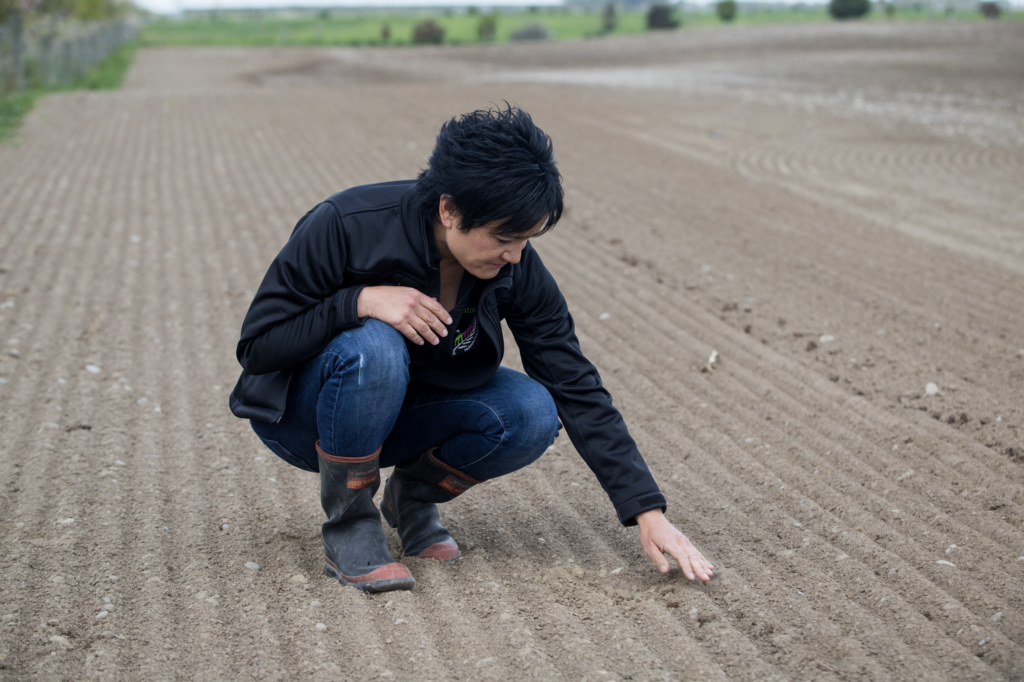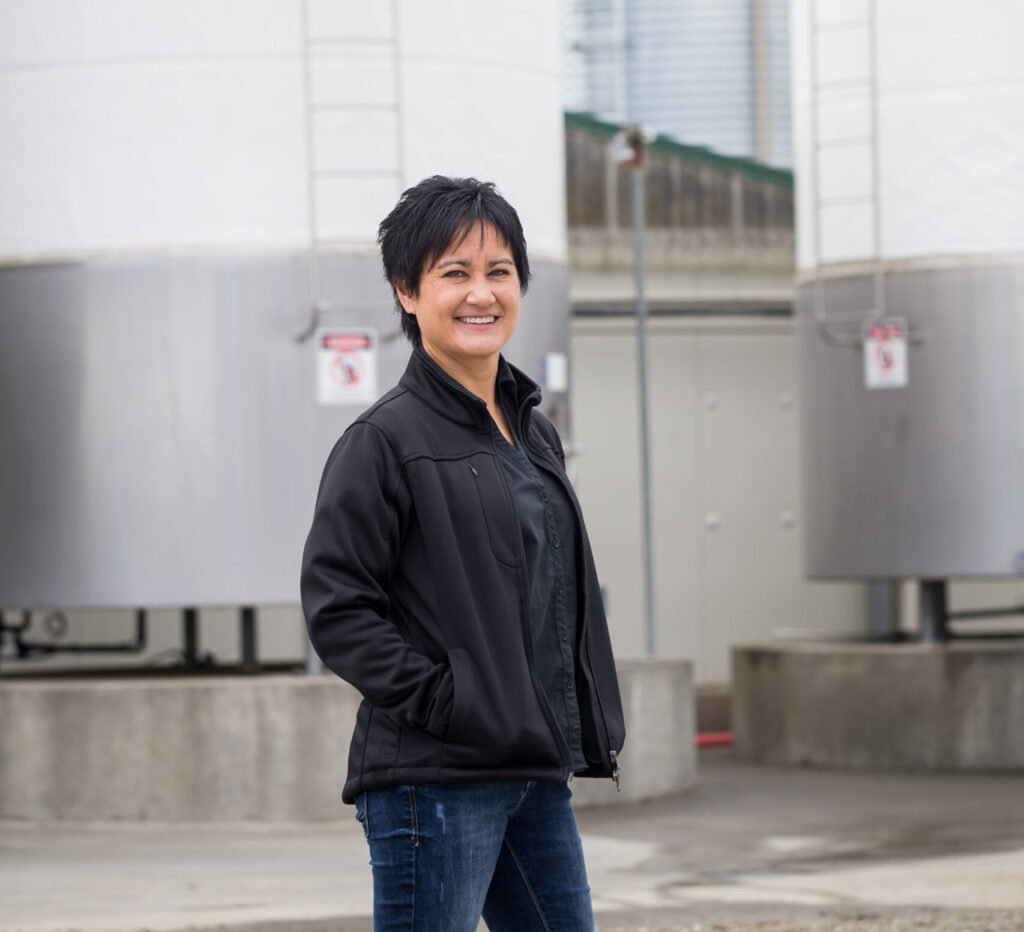Widely recognised as a leader in the dairy industry, Jessie Chan attributes much of her success to her humble beginnings. She was raised with three siblings by her sawmiller father after her mother left when Jessie was 10 years old.
“We grew up pretty quick. We spent a lot of time with Dad on farms, picking pine cones and helping him stack timber. I did my first GST and PAYE when I was 14 because we helped him run the business.”
Chan laughs, adding, “So I got exposed to business pretty early on.”
Though they didn’t have much as kids, Chan says her mother’s early life had been far tougher. She was dropped off at a Hong Kong orphanage aged only three months. When she was 12 years old she was adopted by an Invercargill couple.
“But they decided they didn’t want her and she spent her teenage years through different foster homes,” Chan says.
“It was awful and she didn’t get a good education either. She was treated pretty badly from what I can understand. She has some mental health issues as a result of her childhood, so when we were young she just couldn’t cope and even now, we’ve always looked after her.”
Though she may have at times resented her mum’s absence as a kid, Chan now believes that experience helped her become the woman she is today.
“I get asked to go and talk to groups about leadership and my mum’s experience has taught me a lot, not necessarily about leadership, but about unconditional love and that everybody’s different and people’s experiences shape their behaviour.”
“Her experience is quite extreme but even when I’m around a board table, when I’m doing my work, I always take that with me: actually everybody comes from a different background and experience and those experiences shape their behaviour.”
Today Chan is a director on a variety of boards, including NZ Pork, AgResearch and AgriZero, and previously served on other boards including Ngai Tahu Farming, Alpine Energy and RuralCo.
In her early career she worked for Federated Farmers in a corporate role and later became a Feds delegate when she and her then-husband were dairy farmers and she was a member of the Fonterra Shareholders Council and an associate director with DairyNZ.
“I guess I just try to contribute where I can and it takes me to different places.”

Chan says rather than sitting back and waiting, if it’s an opportunity and it interests her, she will make the effort and put her name forward.
“But equally I get a lot of phone calls saying, ‘I think you’d be really useful here’.”
“Sometimes I might get a call, ‘We’re looking for a rural woman, of colour, who’s a bit different’, and I’m like, ‘I’m not your person because I don’t want to be on your board for that reason. I want to be on your board because I have some skills that you need’. I don’t want to be the token diversity person and other people don’t want to see token diversity people on their boards either.”
Growing up, Chan knew she was different from other kids. She and her siblings were brown-skinned while her dad with his Scandinavian heritage was blonde and blue-eyed.
“If people didn’t know us they’d look at us and say, ‘Who are those four Māori kids you’re carting around?’ And people thought he was our granddad because he looked really old because he smoked all his life and worked out in the sun. People thought we were somebody else’s Māori kids, not his progeny.”
But she says she learnt leadership skills from her father.
“He didn’t lead any organisation or anything but he was a really humble man and he led people. He was really compassionate and patient and he was never afraid to speak the truth and he encouraged that in us as well.
“I aspire to the way Dad operated and leading by example was a massive thing as well, actually putting his money where his mouth was. He raised four kids – it wasn’t easy for him and he could have just walked away.”
Chan says she and her siblings grew up like kids of the 1950s, eating plenty of mutton cooked on the coal range and homegrown veges, but facing ’80s attitudes in hometown Palmerston North.
“School wasn’t fun at times because it wasn’t cool to be half-Chinese back then. It wasn’t that long ago but there was a lot of racism about.
“People used to call Mum a mail-order bride and all that sort of thing and we were scruffy kids ‘cos in the early days Dad was busy working and Mum didn’t know how to look after us, so we were the scruffy brown kids,” she laughs.
At school Chan loved science and when she was 17 she got a job in Fonterra’s research lab in Palmerston North and learnt about product development.
“A benevolent senior scientist really pushed hard to get me in. He saw something and he said to me at the time, ‘I had to convince them to take you because usually you need a bachelor’s degree for this job’.
“I thought, ‘You’ll get 100% from me and I’ve always had that attitude I guess, and that’s what Dad taught us, to give everything 100%.”
Fonterra encouraged her to study food science at university but Chan was more interested in biology so studied for an animal science degree, graduating with honours.
She considered carrying on to do a PhD but after four years of study was ready for something else and went to Wellington, where she had various primary sector jobs, eventually heading a Federated Farmers’ policy team.
“It was quite an exposure at an early age to industry challenges and also my managers rightly always drummed it into me, ‘Make sure you go back to the voice of the farmer and listen to what the farmers want and communicate that to decision makers’.”
Then she met dairy farmer Hayden, a Cantabrian, and life took a different turn when they married and took a sharemilking job at Dorie, just south of the Rakaia River in Mid Canterbury.
They started milking 750 cows on half the farm but when the property was sold to Italian owners they took over the lease of the whole 420ha property and grew their herd to 1700 cows.

It was an intense system. All wintering was done off farm and they bred big Holsteins with overseas genetics.
“But it was hard on everybody, the cows and the staff, and the costs fluctuated, so we came down to 900 cows and went fully self-contained. We did all our own wintering, all our young stock and even grew a bit of barley.”
They also had two boys, Adam, now 10, and Noah, 4, but the couple have since separated. Jessie lives quite close by in Rakaia and shares their care with Hayden.
“Our boys had the privilege of being exposed to the farming life and I think that’s a pretty great start to have.”
She’s now an equity partner with friends in a dairy farm at Springston in Canterbury.
“I decided to invest because I still love the industry and I’m still involved with my various directorships.
“I’d call myself a silent partner but I guess I’ll help with the strategic side of it. We bounce stuff off each other and that works quite well and I think they were quite keen to have equity partners who understood the journey and for us it’s a pretty big deal, our first piece of dirt.”
The journey Chan mentions is the road to ownership that hundreds of New Zealand dairy farmers have embarked on, something that separates them from their inter-generational peers.
“Someone who’s an inter-generational farmer who has this massive pool of capital that they still have to work hard to manage or grow can often come across quite differently, because of their attitude to business, to a sharemilker who worked their butt off through the ranks, took some big risks to buy cows and eventually bought land.
“That person’s mindset or skill set or risk appetite can be quite different to someone who’s got an inter-generational farm.
“I’m not judging any of that, it’s just different and it’s what we work with across our farming spectrum and we’ve got to cater to all of those needs in terms of how our industry’s set up.”
Chan learnt early that every farmer is different and even the grumpiest ones have something to contribute.
“When you get talking, actually they’ve got some really important nuggets of thought and ideas to give, it’s just getting past that gruff exterior to find those gold nuggets.
“There might be some racism or there might be some, ‘Everyone is out to get me’ kind of attitude but once you get past some of that anger and get to the nub of what it is that’s bothering them or their piece of wisdom that have to impart, then actually there’s some gold there if you actually listen.”
Chan understands well why spirits in rural New Zealand are low at present, blaming uncertainly over regulation and disconnection from the food production system for much of that.
“There’s a whole range of things at the moment where it’s really affecting morale because it’s not a clear playing field and meanwhile you have to run a business and figure out what that looks like in 10 years’ time.
“It’s really hard to second-guess that when you don’t know what the politicians are going to do with it.”
But Chan does believe farming has to change to meet a range of challenges, including environmental and climate change, and believes many of the answers will come from science, something close to her heart.
She’s on the board of AgResearch and also the public/private partnership AgriZero, which brings together MPI and Synlait, Fonterra, Silver Fern Farms, Anzco and Rabobank, looking to kick-start science solutions.
AgriZero recently made an investment with research partners to build more methane chambers where the effectiveness of products designed to reduce cows’ methane output can be tested.
“Methane chambers are labour and capital intensive and we want to speed up the ability to test, and the ability to register a product in New Zealand.”
Some amazing science and nous have made the New Zealand dairy industry what it is today, Chan says, and she wants that work to continue.
“Let’s keep combining that science piece with that entrepreneur piece that goes, ‘Actually we can take that science and apply it on farm this way and get a really good outcome’. I think we all want to move forward and do better for the land.”
This article first appeared in the October edition of our sister publication, Dairy Farmer.










